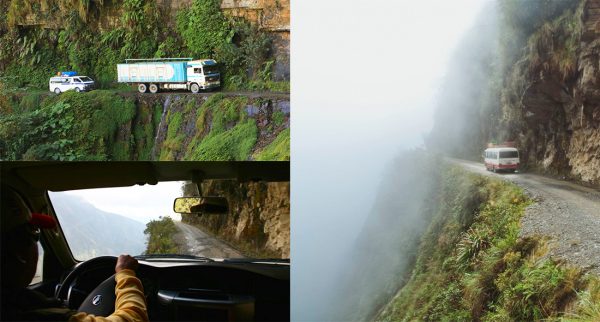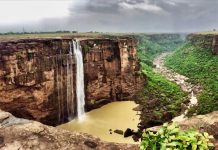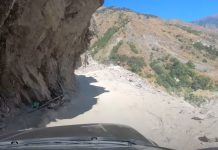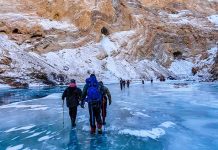Bolivia’s Death Road: Would You Risk it?
Yungas Road, grimly known as ‘Death Road’ due to its notoriously high death rate, was cut into the side of the Cordillera Oriental Mountain chain in the 1930s by Paraguayan prisoners during the Chaco War.
Surrounded by mountainous terrain and terrifying precipices, the winding road stretches 69kms from La Paz to Coroico, connecting the Amazonian rain-forest to the capital city.
From La Paz, Yungas Road road climbs to around 4,650 meters (15,260 ft) at La Cumbre pass, before gradually descending to 1,200 meters (3,900 ft) at the town of Coroico. The drop in altitude means travelers experience both chilly conditions in the Altiplano highlands and hot humid conditions in the rain-forests.
Since the 1950s, Death Road was the only link between La Paz and the Yungas region of Bolivia. It was not uncommon for crowded buses and trucks overloaded with people, wood and crops to overtake each other on the 3 meter hairpin turns, even at night. These perilous conditions meant many of the buses and trucks went down the side of the cliffs taking with them men, women and children, as well as a lot of people’s livelihoods.
A combination of single track roads, 900m high cliffs, rainy weather, limited visibility, rockfalls, and lack of guardrails, has resulted in many motorists plummeting to their death.
It is estimated that 200 to 300 drivers were killed yearly along Yungas Road and as late as 1994 there were cars falling over the edge at a rate of one every two weeks.
One of Bolivia’s most tragic road accidents happened on July 24th 1983 when an overcrowded bus veered off the side of the road and into a canyon killing more than 100 passengers.
Lining the side of Death Road, you will find an unsettling number of crosses and altars marking some of the many spots where people lost their lives. It is no shock to learn that in 1995, the Inter-American Development Bank dubbed Yungus Road “The World’s Most Dangerous Road”.
After 20 years of hard work, Yungas road was modernized to include two driving lanes, asphalt pavement, drainage systems and guardrails. In 2009, construction of an alternative road replacing the dangerous 64km stretch was completed with all traffic being diverted to the new road. Thankfully, motorists can now travel from La Paz to Coroico without fearing the journey may be their last.
Even with these improved conditions, Yungas Road shows no mercy. Nowadays, the death toll is limited to local workers and daredevil backpackers still using the infamous road. It is believed that more than 22 cyclists have lost their lives on Bolivia’s “Death Road” since 1998.
Death Road Tours
Despite these statistics, the 64km downhill bike ride has been a draw card for thrill seekers and avid mountain-bikers since the 1990s.
While not for the faint-hearted, the adrenaline-pumping Death Road tour is suitable for both confident beginners and expert mountain bikers. There are a multitude of Death Road tour companies around La Paz ranging in price and quality. Often it’s a case of “you get what you pay for”, and those looking for the cheapest option can be left with an unreliable, unprofessional and unsafe tour.

Starting at $124 US, Gravity Assisted Mountain Biking are not only the longest operating company on the road, but also the highest ranked biking company in Bolivia, priding themselves on providing the best in safety, professionalism and fun. And for those on a tight scheduled, Gravity also offer guaranteed departures 363 days of the year (closed on Christmas and New Years Day)!
Barracuda Biking is another good, albeit cheaper option, with tours starting at $72 US. While the no frills biking company use older bikes than Gravity, they still meet all safety standards, ensuring customers enjoy a safe and affordable bike trip down the world’s most dangerous road.
If you’re looking for a truly exhilarating, world-class bike ride through some of Bolivia’s most beautiful scenery, don’t hesitate to book a ‘Death Road Tour. Fingers crossed you’ll live to tell the tale!
Source – lapazlife.



















